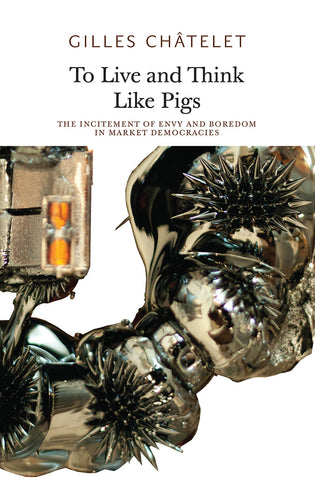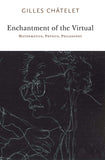To Live and Think Like Pigs
To Live and Think Like Pigs:
The Incitement of Envy and Boredom in Market Democracies
Gilles Châtelet
Urbanomic/Sequence
November 2014
Translated by Robin Mackay
Foreword by Alain Badiou
Paperback 115x175mm, 190pp.
ISBN 978-0-9832169-6-4
Gilles Châtelet’s scathing polemical tract opens at the end of the 70s, when the liberatory dreams of ‘68 are beginning to putrefy, giving rise to conditions more favourable to a new breed of self-deluding ‘nomads’ and voguish ‘gardeners of the creative’. Gulled by a ‘realism’ that reassures them that political struggle is for anachronistic losers, their allegiances began to slide inexorably toward the ‘revolutionary’ forces of the market’s invisible hand, and they join the celebrants of a new order governed by boredom, impotence and envy….
As might be expected of Châtelet—mathematician, philosopher, militant gay activist, political polemicist, praised by contemporaries such as Deleuze and Badiou for his singularly penetrating philosophical mind—this is no mere lament for a bygone age. To Live and Think Like Pigs is the story of how the perverted legacy of liberalism, allied with statistical control and media communication, sought to knead Marx’s ‘free peasant’ into a statistical ‘average man’—pliant raw material for the cybernetic sausage-machine of postmodernity.
Combining the incandescent wrath of the betrayed comrade with the acute discrimination of the mathematician-physicist, Châtelet proceeds to scrutinize the pseudoscientific alibis employed to naturalize ‘market democracy’. As he acerbically recounts, ‘chaos’, ‘emergence’, and the discourses of cybernetics and networks merely impart a futuristic sheen to Hobbesian ‘political arithmetic’ and nineteenth-century ‘social physics’—a tradition that places the individual at the center of its apolitical fairy-tales while stringently ignoring the inherently political process of individuation.
When first published in 1998, Châtelet’s book was a fierce revolt against the ‘winter years’ and a mordant theory-science-fiction of the future portended by the reign of Reagan-Thatcher-Mitterand. Today its diagnoses seem extraordinarily prescient: the ‘triple alliance’ between politics, economics and cybernetics; the contrast between the self-satisfied ‘nomadism’ of a global overclass and the cultivated herds of ‘neurolivestock’ whose brains labour dumbly in cybernetic pastures; the arrogance of the ‘knights of finance’; and the limitless complacency and petty envy of middle-class dupes haplessly in thrall to household gods and openly hostile to the pursuit of a freedom that might require patience or labour.
Mercantile empiricists and acrobat-intellectuals, fluid nomads and viscous losers, Robinsons on wheels, Turbo-Bécassines and Cyber-Gideons…Châtelet deploys a cast of grotesque ‘philosophical personae’ across a series of expertly-staged set-pieces: from Hobbes’s Leviathan to Wiener’s cybernetics; from the ecstasies of Parisian nightlife to the equilibrial dystopia of Singapore’s ‘yoghurt-maker’; from the mercantile empiricist for whom the state is a glorified watermelon-seller to the coy urbanite with a broken hairdryer; from the ‘petronomadic’ stasis of the traffic jam to the financier chasing the horizon of absolute volatility; from the demonization of cannabis to the fatuous celebration of ‘difference’.
To Live and Think Like Pigs is both an uproarious portrait of the evils of the new world order, and a technical manual for its innermost ideological workings. Châtelet’s diagnosis of the ‘neoliberal counter-reformation’ is a significant moment in French political philosophy worthy to stand alongside Deleuze’s ‘Control Society’ and Foucault’s ‘liberal governmentality’. His book is crucial reading for any future politics that wants to replace individualism with an understanding of individuation, libertarianism with liberation, liquidity with plasticity, and the statistical average with the singular exception. Its appearance in translation is an important new contribution to contemporary debate on neoliberalism, economics and capitalist subjectivation.
Gilles Châtelet (1944-1999) began his studies at the École Normale Supérieure de Fontenay-Saint-Cloud. During the late 1960s he was a member of an anti-Stalinist student faction of the French Communist Party. After 1968, a stay at UC Berkeley brought him into contact with key protagonists of the Beat Generation. He returned to France and joined the Front Homosexuel d’Action Révolutionnaire (FHAR), and befriended Roland Barthes, Daniel Guérin and Guy Hocquenghem. Meeting Michel Foucault was an important marker in the development of his political thinking; as was his friendship with Félix Guattari and Gilles Deleuze, who played a decisive role in renewing his passion for philosophy. He obtained his PhD in Pure Mathematics from the University of Paris XI in 1975, writing his thesis on differential topology. In 1979 he became Professor of Mathematics at the University of Paris VIII. Around this time he established a dialogue with René Thom that continued until his death. He was programme director at the Collège International de Philosophie from 1989 to 1995, during which period he published the important work Les Enjeux du Mobile: Mathématique, Physique, Philosophie. In 1994 he joined the Laboratoire Disciplinaire Pensée des Sciences, founded by Charles Alunni at the École Normale Supérieure in Paris. There, he had an active and influential role in the seminar, ‘Actuality, Potentiality and Virtuality’.
We Lived and Thought Like Pigs:
Gilles Châtelet's Devastating Prescience
by Liam Gillick
e-flux, Journal #100, May 2019VIEW
Sunday Rationalism
by Knox Peden
3:AM Magazine, January 30, 2015
VIEW
To Live and Think Like Pigs!
by Hamish Win
White Fungus, Issue 14



